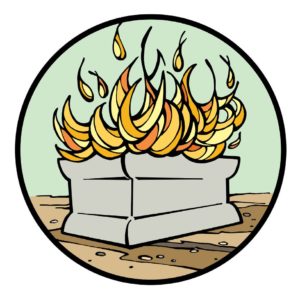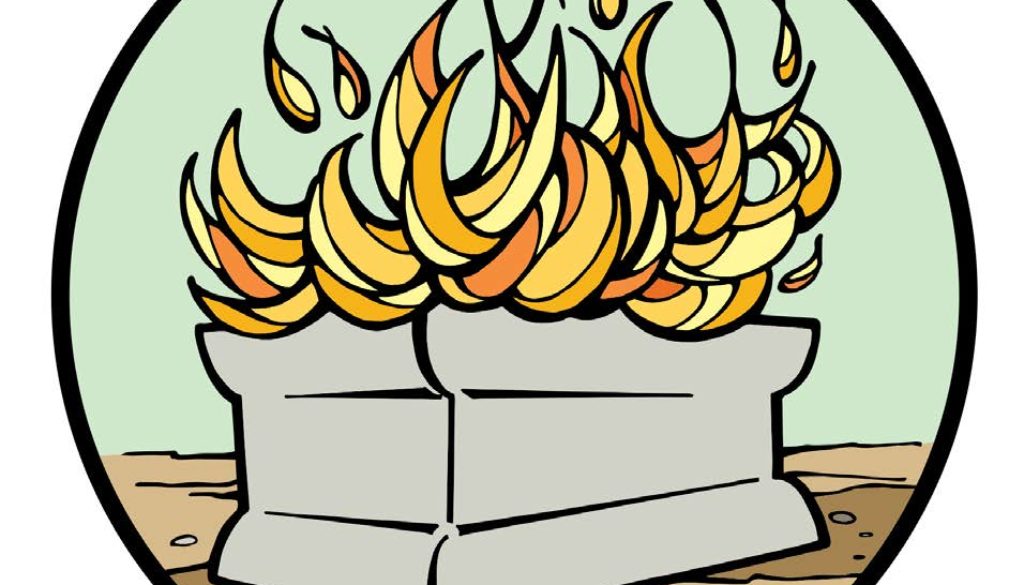Jesse Tree December 13 Fire & Altar

Fire & Altar reading: 1 Kings 18:20-40
Elijah calls a contest between Israel’s God and Baal. God gives His people a SURE sign of His power and superiority. Baal waited it out in silence.
This is one of my favorite stories! I increased the reading so that the whole story was included. Elijah proposes a direct contest between “the God of Abraham, Isaac and Jacob” and Baal. He is even a gentleman and lets Baal’s priests go first. Elijah set the parameters. All Israel was in attendance and agreed that his contest rules were “well spoken.”
I was curious to see if fire was among the traits ascribed to Baal. I didn’t find a direct mention of fire. I did find that Baal was supposed to be the bringer of rain. For more than three years Israel had had no rain. Elijah had prayed and God shut the heavens so no rain or even dew appeared anywhere in the land. According to the source I found, Baal was supposed to have a battle every seven years with his rival. If he lost there would be a drought for seven years. This drought in Israel lasted three and a half. The shortened timeframe was another proof that the God of Abraham, Isaac and Jacob was in control.
One of my favorite parts in this story is when Elijah starts taunting the prophets of Baal. Four hundred and fifty men are dancing about their altar, calling out to their god and receiving nothing in response. They have been doing this ALL morning! It’s noon now and Elijah throws out some ‘possible scenarios’ as to why their god hasn’t responded yet. “Maybe he is busy thinking about something”, “Maybe he is asleep and needs to be woken up first”, and my all-time favorite “Maybe he is in the bathroom.”
Elijah’s ‘helpful hints’ didn’t do Baal’s prophets any good. They did try harder though to get his attention. They began cutting themselves. The called out to Baal from morning until nearly the time of the evening sacrifice with NOTHING to show for it.
Now it’s Elijah’s turn. Elijah doesn’t take the easy or expected route of laying out his sacrifice and calling upon his God. Instead he makes the task harder. First, he rebuilds the altar that was torn down. In doing so he includes a stone for each of the tribes of Israel. Second, he digs a trench around the altar. This trench is deep enough to hold 7.3 liters or 2 gallons (the imperial measure of quarts is used in this reference). The people are all watching as Elijah goes about his work. They are probably wondering what he is doing by now. Third, he lays out the wood and the sacrifice.
The people are ready for him to call on God now, but he doesn’t do that. Instead, Elijah calls for someone to fill four jars with water. Maybe he wants the water nearby so he can douse the fire if it gets out of hand. No. He wants it poured on the offering. Whatever you say. The water is poured all over the bull and the wood. It runs into the spaces between the rocks and flows into the trench. It is soaked up by the thirsty ground. Maybe he was just washing the blood away. The wood is wet but should still burn if the fire is hot enough.
Is it time yet to call on God? Nope. Elijah calls for four more jars of water to be poured on the sacrifice and altar. The people comply again. The water flows again over the sacrifice, wood and stones. It settles in the trench. Is Elijah done now. Not yet.
Elijah calls for another round of water. Four more jars are brought and poured over the sacrifice. The wood is beyond wet. Water is standing in places. The trench is at capacity. NOW Elijah turns to the Lord. Elijah doesn’t jump around or cut his arms. He simply states his need. “O Lord, God of Abraham, Isaac, and Israel, let it be known this day that you are God in Israel, and that I am your servant, and that I have done all these things at your word. Answer me, O Lord, answer me, that this people may know that you, O Lord, are God, and that you have turned their hearts back” (verses 36b-37).
Fire came IMMEDIATELY from Heaven. No need to worry about the wet wood. No problem with the standing water. God’s fire consumes the sacrifice and the wood. It also consumes the stones of the altar, the water in the trench and the dust of the ground near the altar. IN AN INSTANT.
The people fall on their faces in awe. They also comply with Elijah’s command to bring the prophets of Baal to a place where they will lose their lives.
Did you notice that God was silently waiting while all this took place? He could have interrupted the prophets of Baal at any time. He could have struck them dead as they danced about. But he waited. He waited while Elijah took elaborate measures to increase the difficulty of His task. He could have sent fire as soon as the sacrifice was laid on the altar, but He waited.
God waited until EVERYTHING was completed. He left nothing undone. He even waited until the time of the evening sacrifice. He left NO DOUBT as to His supremacy; His power. HE answered by fire, just as the test stated.
God showed the same patience in inserting His Son into the world. He waited until everything was in place. His people were turning back to Him. They were looking for their Messiah. They didn’t get Him the way they expected, but He still came. Just as Elijah’s sacrifice was unusual, so was the appearance of the Messiah; God’s Son.
As we count down to the anniversary of His birth we are watching for His return. The signs are everywhere but we don’t know the exact time of His return. We stand and watch, just as the people did that day on Mt. Carmel. We don’t stand idly by as they did. We help in the process of preparation. Keep watching! He IS coming again.
Father God, thank You for Your stories. I LOVE reading them! Thank You also for knowing EXACTLY the right time to step in. I know You aren’t ‘otherwise occupied’ when I call out to You. You hear me when I call and know when to help me wait, when to answer swiftly and when to tell me no. I trust You and Your timing, even when my patience is getting low.



